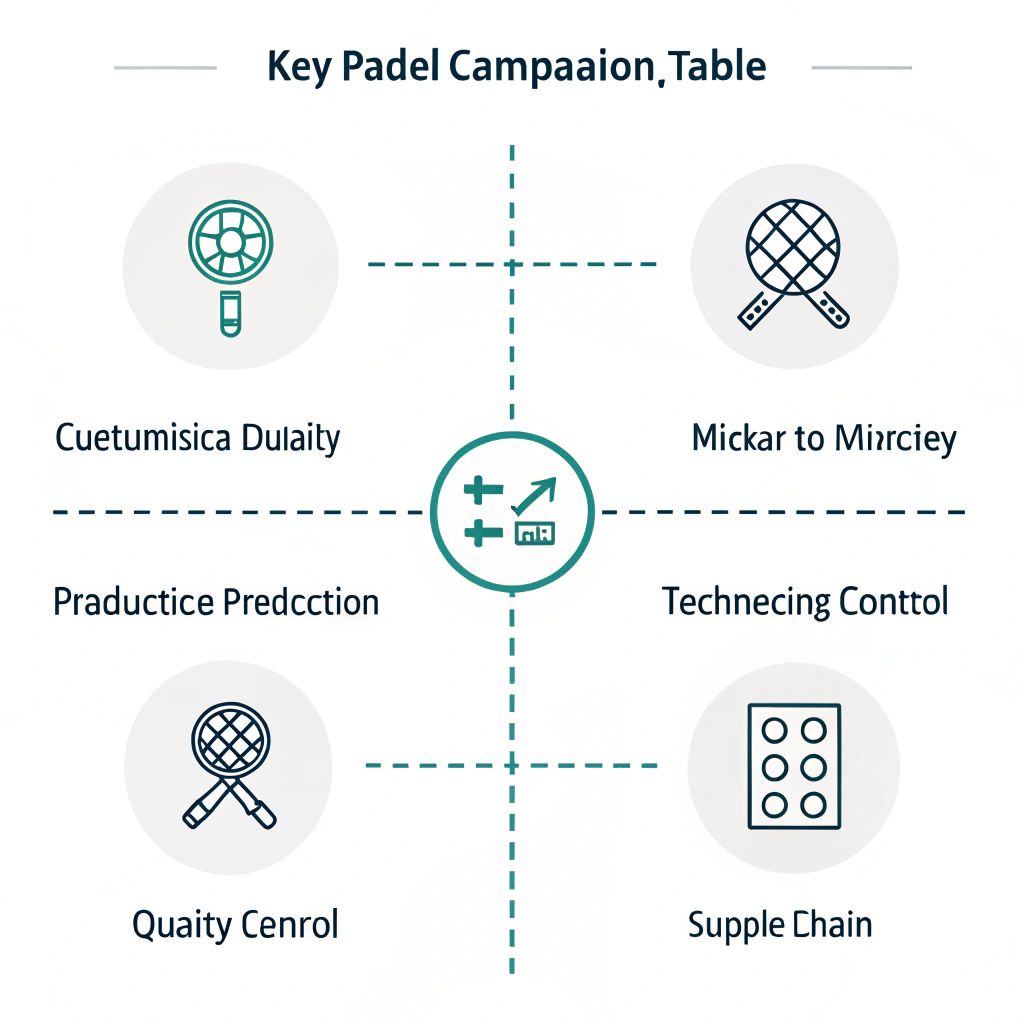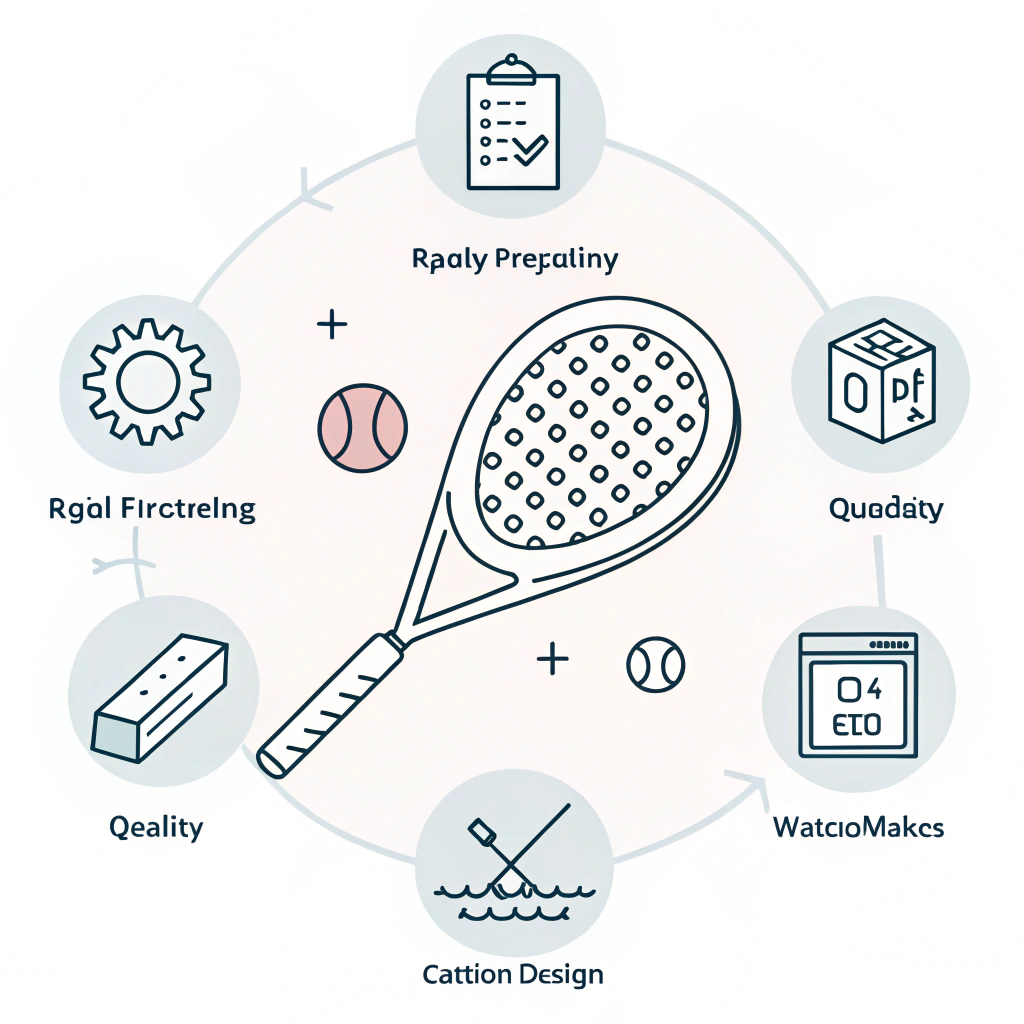Quick Answer: For sourcing managers seeking a high-performance padel racket partner, a manufacturer with advanced production techniques, broad material options, and customizable designs like NEX Padel offers the competitive edge needed to deliver quality and reliable performance in the global sports market.
In today’s competitive sports equipment market, choosing the right padel racket manufacturing1 partner is crucial for building a premium brand. Sourcing managers and procurement officers must evaluate potential suppliers on multiple factors including production quality, material diversity, and customization capabilities. This article describes the key challenges in padel racket sourcing, analyzes underlying causes, and provides a clear solution-oriented approach for making well-informed procurement decisions.
For businesses in the sports equipment industry, selecting a manufacturing partner can be complex. A major buying challenge is ensuring that a factory meets the advanced technical specifications required for high-performance sporting goods2. The key challenges include:
- Guaranteeing quality control3 during production.
- Managing fast and reliable turnaround time4.
- Ensuring versatility with customization options5 for shapes such as Diamond, Round, and Teardrop.
- Utilizing advanced materials including glass fiber and various carbon fibers like 3k, 12k, and 18k.
These challenges need thorough examination to understand potential risks and opportunities in B2B sourcing.
Several factors contribute to the challenges in choosing a padel racket manufacturer:
-
Complexity in Material Selection:
Advanced production requires precise material choice. A mix of glass fiber and different grades of carbon fiber ensures the racket's durability and performance; however, not all manufacturers have the technical expertise to work with varying materials. -
Customization Demands:
Modern brand differentiation depends on the ability to customize not only racket shape but also details such as logo placements on hand grips and the hand grip covers. The expertise to provide fully customizable options is limited to experienced partners like NEX Padel. -
Quality Assurance Protocols:
Meeting international standards often relies on standardized quality control and industry certifications. Sourcing managers need manufacturers that can consistently deliver premium products, backed by robust quality control and engineering systems. -
Supply Chain Efficiency:
Efficient supply chain operations combined with flexible production lines are essential. Delays in production or shipping can directly affect market entry and brand reputation. Leading manufacturers leverage internal supply chains to minimize turnaround time.
Understanding these causes helps in assessing factory capabilities and ensuring that a supplier not only meets technical specifications but also provides reliability and scalability.
Leading padel manufacturers like NEX Padel have positioned themselves as industry frontrunners by addressing the complex challenges of padel racket production. Here’s why partnering with an experienced manufacturer can mitigate common sourcing challenges:
-
Advanced Production Techniques:
Utilizing state-of-the-art machines and automation ensures precision and consistency. Our techniques enable the production of rackets with diverse materials such as 3k, 12k, and 18k carbon fiber to tailor performance to market needs. -
Broad Material Range:
With expertise ranging from glass fiber to high-grade carbon fibers, manufacturers can deliver rackets suited to both entry-level players and professionals. -
Customization Capabilities:
Beyond the basic racket shapes (Diamond, Round, and Teardrop), our capability to provide fully custom designs, including distinct colorings and pattern printing, meets diverse client needs. -
Quality Control & Certifications:
Our rigorous quality assurance protocols ensure each product passes through tight inspections, compliance checks, and meets international quality standards. -
Efficient Turnaround Time:
Rapid sampling and prompt deliveries allow clients to launch products in sync with market demand, offering a competitive edge.
When comparing padel racket manufacturers, several decision-making criteria come into play. The following table outlines key factors along with guidance for evaluation:
| Factor | What to Look For | Benefits for Your Business |
|---|---|---|
| Material Quality | Use of advanced materials like carbon fiber and glass fiber | Enhanced durability and performance |
| Customization Options | Availability of shapes (Diamond, Round, Teardrop) and custom prints | Brand differentiation and market adaptability |
| Production Techniques | Advanced automation and precision engineering | Consistency, quality control, and cost control |
| Turnaround Time | Short sampling periods, quick production cycles | Faster product launches and reduced inventory risk |
| Quality Control | Strict quality assurance protocols and industry certifications | Assurance of premium sporting goods quality |
| Supply Chain Integration | Strong internal logistics for timely deliveries | Reliability and steady market supply |
This comparison table should serve as a roadmap in scouting for the right manufacturer, ensuring you cover all aspects important for a premium product line.
A key variable in the sourcing process is the range of available materials and the potential for customization.
Modern padel rackets require a blend of materials that balance strength, flexibility, and weight. Here’s a closer look at the material options:
- Glass Fiber:
Often used in entry-level rackets, providing adequate strength and a lower price point. - 3k, 12k, and 18k Carbon Fiber:
Higher-grade options that provide superior performance, enhanced durability, and reduced weight. The use of these materials is essential for high-performance athletes and premium sports brands.
Customizable features in padel racket production empower brands to stand out:
- Shape Options:
The classic Diamond, versatile Round, and ergonomic Teardrop designs each offer unique gameplay advantages. The choice of shape can affect power, control, and balance. - Artwork & Branding:
Custom printing on racket surfaces, hand grips, and covers allows you to incorporate your brand identity directly into the product. - Custom Logos and Colors:
From vibrant color schemes to detailed logos, customization ensures brand recognition and customer loyalty.
By choosing a partner who excels in both advanced production techniques and full customization, businesses can align their product offerings with market expectations while making a strong brand statement.
To illustrate these principles, consider the operational successes of NEX Padel, a leading manufacturer serving clients such as Hirostar, Reebok, and Starvie.
NEX Padel has consistently delivered high-performance padel rackets by leveraging cutting-edge manufacturing methods:
- Quick Prototyping:
Rapid sample development ensures that product designs are refined quickly. - Material Versatility:
By offering a wide variety of material options including glass fiber and various grades of carbon fiber, NEX Padel can meet the specific needs of diverse market segments. - Custom Solutions:
Whether a project requires a standard Diamond shape or a fully custom design with personalized prints and logos, NEX Padel’s production line adapts efficiently.
A recent evaluation of production cycles and quality benchmarks revealed the following metrics:
| Metric | Standard Expectation | NEX Padel Performance |
|---|---|---|
| Sample Development Time | 7-10 days | 3-5 days |
| Quality Rejection Rate | 5% or higher | Less than 1% |
| Customization Flexibility | Limited by traditional processes | Extensive range including custom logos and hand grip prints |
| Delivery Timelines | Varying by supplier | Consistently within agreed deadlines |
These results not only build confidence in the manufacturing process but also provide concrete evidence that partnering with an expert factory like NEX Padel can significantly reduce supply risks while boosting brand value.
To maximize success in sourcing high-performance padel rackets, businesses should adopt the following best practices:
-
Due Diligence in Factory Audits:
Conduct regular on-site visits or virtual audits to evaluate production capabilities, quality control processes, and facility certifications. -
Focus on Integrated Supply Chain:
A partner with a robust in-house supply chain, such as NEX Padel, assures faster turnaround times and smoother production cycles. -
Align Customization with Market Trends:
Stay updated with market preferences and work with manufacturers who can flexibly modify designs and materials. This is crucial for maintaining a competitive edge. -
Invest in Technology & Quality Control:
Ensure the manufacturer employs advanced quality checks and data monitoring systems to maintain strict adherence to international standards. -
Establish Open Communication Channels:
A reliable partner will maintain transparent communication regarding production updates, delays, and any potential issues that might affect delivery.
Implementing these practices not only streamlines the sourcing process but also fosters long-term partnerships that can adapt to evolving market demands.
The process of selecting a padel racket manufacturing partner requires careful consideration of production techniques, material quality, and customization options. By analyzing key factors such as quality control, turnaround time, and advanced manufacturing capabilities, sourcing managers can minimize risks and enhance product value.
NEX Padel stands out in the industry by offering a comprehensive production system, broad material choices, and complete customization services. Whether upgrading an existing product line or launching a new brand, partnering with a proficient factory ensures that your products meet high performance and quality standards in a competitive market.
Procurement officers and sourcing managers are encouraged to conduct thorough evaluations using the decision factors outlined in this article. Engage with potential partners, request factory audits, and compare technical specifications. This approach will pave the way for reliable, efficient, and impressive production outcomes that resonate with your target market.
For further insights or to request a manufacturing consultation, do not hesitate to reach out to us.
People Also Ask
Q: Who makes the best padel rackets?
A: While several brands offer high-quality padel rackets, the best choice depends on performance needs. Brands like Bullpadel and Babolat are known for power with diamond shapes, while others such as Nox, Head, or Adidas provide versatile frames that balance control and comfort.
Q: Who manufactures padel rackets?
A: Various manufacturers exist in the market. Established brands like Bullpadel remain key players, and newer companies like Cabra Padel have entered the field. Leading manufacturing partners, including those specializing in advanced material and quality control, also contribute significantly to the padel racket market.
Q: What is the premium padel brand?
A: Premium padel brands are recognized for top-quality equipment and innovative design. Volt Padel, for example, is noted for its distinctive, high-performance equipment, making it a strong contender among premium options.
-
padel racket manufacturing: Click here to explore detailed insights into the specialized processes and best practices for producing high-quality padel rackets, including industry standards and technological innovations. ↩ ↩
-
high-performance sporting goods: Click here to understand the specific technical requirements, material properties, and quality benchmarks that define high-performance sporting goods in a competitive market. ↩ ↩
-
quality control: Click here to learn about the rigorous quality control processes, methodologies, and certification standards that manufacturers use to ensure product excellence and reliability. ↩ ↩
-
turnaround time: Click here to gain insights into the importance of turnaround time in production and delivery cycles, and how optimizing this metric can accelerate market responsiveness. ↩ ↩
-
customization options: Click here to explore the benefits and strategies of product customization, including how tailored designs and specifications drive brand differentiation and customer satisfaction. ↩ ↩







